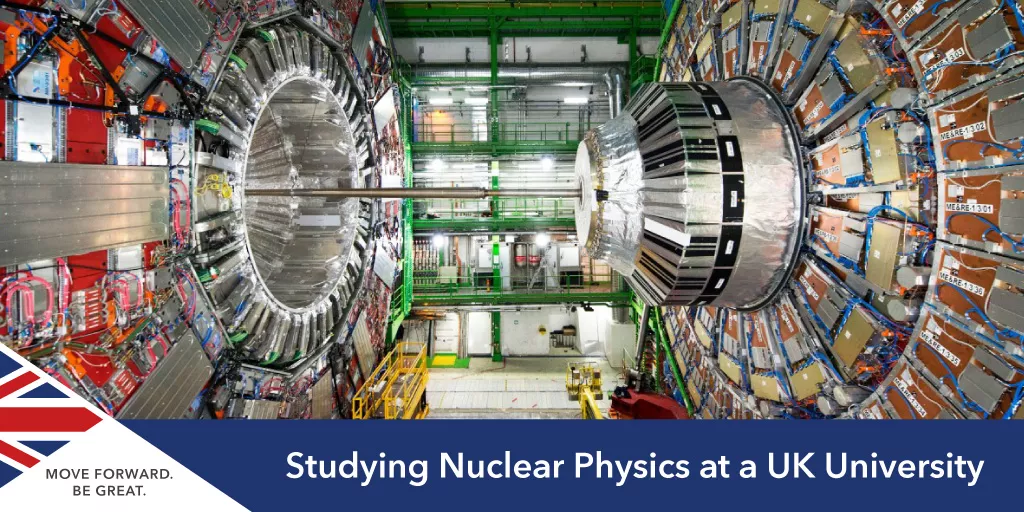The UK is home to some of the world’s leading universities for nuclear physics, according to the latest THE World University Rankings. Edinburgh, Manchester, and the University of York are all ranked in the global top 10 for the subject.
In addition to leading universities, the UK has world-renowned research institutes dedicated to nuclear physics, such as the Culham Centre for Fusion Energy and the Dalton Nuclear Institute.
Learn more about the best nuclear physics universities in the UK below, or book a free consultation with SI-UK India today.

Best Nuclear Physics Degree in the UK
1. University of Edinburgh
The study of Nuclear Physics at the University of Edinburgh demands a delicate balance between experimental techniques, theoretical understanding, and computational skills. Multi-faceted experiments are often conducted at the University in collaboration with renowned international laboratories. These same detector technologies also have plenty of applications in the form of position sensing. You will stay afloat in the computational aspects by learning to work with large data sets and using machine learning and other similar advanced techniques in data science.
- Course: Particle and Nuclear Physics MSc
- Entry requirements: UK 2:1 honours degree, or its international equivalent, in physics or a related subject
- International fees: £33,300
2. University of Manchester
The Department of Physics and Astronomy at the University of Manchester excels in teaching and research, with deep interests in the areas of contemporary research. As a nuclear physics student at Manchester, you will have the opportunity to conduct research in cutting-edge facilities and work with world-leading scientists. The University offers a range of undergraduate and postgraduate courses in nuclear physics, with specialisations that you can choose according to your future academic goals.
- Course: MSc in Research Nuclear Physics
- Entry requirements: Lower Second UK honours degree, or international equivalent, in a relevant science or engineering discipline.
- International fees: £25,500
3. University of Glasgow
The University of Glasgow is one of the UK’s leading centres for nuclear physics research and teaching. The university’s world-class facilities and expert staff provide an excellent environment to study nuclear physics and you will develop your career and broaden your knowledge with a nuclear physics degree from the University of Glasgow.
The Masters in Nuclear and Environmental Physics provides training in physics, applications of nuclear energy generation (and low-carbon energy more generally), and the roles played by nuclear processes in environmental modelling and medical physics.
- Course: Nuclear & Environmental Physics MSc
- Entry requirements: A 2:1 Honours degree or equivalent in Physics.
- International fees: £25980
4. University of Birmingham
The nuclear physics course at the University of Birmingham is delivered jointly by the School of Metallurgy and Materials and the School of Physics and Astronomy. The University of Birmingham, one of the best places to study nuclear science, is home to a team of experts committed to education through research and development. The University holds 60+ years of experience in teaching nuclear reactors and 100+ years of experience in teaching materials science.
- Course: Nuclear Science and Materials BSc
- Entry requirements: AAB in A level, including mathematics and physics at grade A
- International fees: £27,180
5. University of York
The University of York’s School of Physics, Engineering and Technology offers a new Master’s degree in fusion energy engineering for students with a background in science.
The University of York’s School of Physics, Engineering and Technology applies fundamental physics and engineering expertise to drive science and technology innovation. The well-established industry links translate our research into solutions to real-world problems.
The nuclear fusion program is focused on fusion research, making it an excellent way to explore your interest in fusion and prepare for a career in this field. You will have unrivalled opportunities to interact with world-class international fusion scientists. You’ll also find world-class facilities and laboratories, which will make the MSc in Fusion Energy an excellent way to explore your interests across engineering and science and medicine.
- Course: MSc Fusion Energy
- Entry requirements: 2:2 or equivalent in Physics or a related discipline
- International fees: £27,200
6. University of Sussex
The University of Sussex offers a cutting-edge MSc in Particle Physics, providing a comprehensive and in-depth exploration of this fascinating field. The course delves into the universe's fundamental building blocks, exploring the latest discoveries and theoretical advancements. With a strong emphasis on research-led teaching, students collaborate with world-renowned physicists, gaining hands-on experience with state-of-the-art experimental facilities.
- Course: Particle Physics MSc
- Entry requirements: An upper second-class (2.1) undergraduate honours degree or above.
- International fees: £22,975
7. Swansea University
The BSc in Physics with Maths or Physics at BBB level from Swansea University offers an exciting opportunity for students passionate about the natural sciences. This undergraduate degree focuses on exploring the depths of physics while incorporating essential mathematical elements. A strong emphasis on research and practical experience ensures students are well-prepared for diverse careers in the field.
- Course: Physics with Particle Physics and Cosmology, BSc (Hons)
- Entry requirements: A-Level: BBB, International Baccalaureate (IB) score of 32, or a BTEC qualification with DDD.
- International fees: £ 21,750
8. University of Bristol
The MSc in Nuclear Science and Engineering at the University of Bristol is a cutting-edge postgraduate programme that equips students with in-depth knowledge and skills in the field of nuclear science. Students engage in practical training, benefiting from the university's state-of-the-art facilities and research expertise and the programme aims to produce highly skilled professionals capable of addressing global energy challenges and contributing to advancements in nuclear science and engineering.
- Course: MSc Nuclear Science and Engineering
- Entry requirements: An upper second-class honours degree (or international equivalent) in an engineering or science discipline. A-level Mathematics (or equivalent).
- International fees: £28,600
9. University of Brighton
The University of Brighton offers an exceptional postgraduate research programme in Nuclear Physics, catering to aspiring researchers passionate about unlocking the mysteries of the atomic world. Research areas encompass a wide range of topics, including nuclear structure and reactions, nuclear astrophysics, and nuclear instrumentation. Students benefit from access to state-of-the-art laboratories and collaborative projects.
- Course: Nuclear Physics PhD
- Entry requirements: A research proposal, references, a personal statement and a record of your education.
- International fees: £15,300
10. University of Liverpool
The BSc (Hons) in Physics with Nuclear Science at the University of Liverpool is an undergraduate degree that explores the fascinating world of nuclear physics. Students in this programme gain a strong foundation in core physics principles while specialising in nuclear science and its applications. The curriculum covers nuclear structure, nuclear reactions, and radiation detection, among other topics.
- Course: BSc (Hons) in Physics with Nuclear Science
- Entry requirements: ABB, including Physics and Mathematics at A level. International Baccalaureate: 33 points that must include 6 points each from Physics and Mathematics at a Higher level.
- International fees: £26,100
Career Opportunities after a Nuclear Physics Degree
From assisting in radiation safety and operating nuclear test equipment to designing power plants and developing advanced medical technologies, this diverse discipline offers a multitude of pathways to explore.
- Medical Physicist | As a medical physicist, you'll be heavily involved in the healthcare sector, particularly in medical facilities that use nuclear technology for diagnosis and treatment. Your primary responsibility is to ensure the quality control and safe use of nuclear medical equipment.
- Nuclear Technician | As a nuclear technician, your primary role is to support and assist other specialists in their work within the nuclear field. This can include various tasks related to radiation safety and handling.
- Nuclear Data Analyst | Nuclear data analysts gather, process, and explain nuclear data used in science and engineering. This data is crucial for designing nuclear reactors, nuclear medicine, and other nuclear-related fields.
- Nuclear Policy Analyst | As a nuclear policy analyst, you'd use your nuclear physics knowledge along with understanding policy, politics, and international relations. Your expertise would be useful in government organisations, think tanks, or consulting firms.
- Nuclear Engineer | As a nuclear engineer, you'll be engaged in various aspects of nuclear technology. One of the primary areas is the design, construction, operation, and maintenance of nuclear power plants.
Nuclear Physics Scholarships
Several universities and organisations in the UK offer scholarships and fellowships for students and scientists interested in studying theoretical physics, nuclear physics, and related subjects.
- Higgs Scholarships at the University of Edinburgh: The School of Physics and Astronomy provides twelve scholarships for students applying to MSc programmes like Theoretical Physics, Mathematical Physics, Particle and Nuclear Physics, and Astrobiology and Planetary Sciences. Each scholarship is worth £10,000 and will be deducted from the tuition fee for one academic year.
- The Royal Society - University Research Fellowships: This fellowship is for early-career scientists in the UK who show potential to become leaders in their field. The funding covers 8 years, including the applicant's salary and research expenses.
- The London Institute for Mathematical Sciences (LIMS) Scholarships: LIMS offers scholarships for exceptional postgraduate students studying theoretical physics, including nuclear physics.
- University of Oxford - Clarendon Scholarships: Clarendon Scholarships are prestigious awards for outstanding graduate students worldwide, including those studying nuclear physics.
- Imperial College London - President's Scholarships for Excellence in Science and Engineering: Exceptional postgraduate students in scientific disciplines, including nuclear physics, can apply for these competitive scholarships. They offer financial support for research and academic pursuits.
Study Nuclear Physics in the UK
If you are interested in studying Nuclear Physics in the UK, arrange your free consultation with SI-UK India today.
Nuclear Physics Degree FAQ
Is nuclear physics a good career?
Nuclear physics offers opportunities to work in different places like universities, research centres, and the nuclear industry. It helps us understand fundamental particles and energy generation.
What is the highest-paying nuclear job?
The highest-paying nuclear jobs can vary depending on the specific job and where you work. Jobs in research, nuclear energy, and engineering often offer higher salaries. Examples of high-paying positions include nuclear physicist, nuclear engineer, and senior research scientist.
How many years does it take to study nuclear physics?
Usually, an undergraduate degree takes about 3 to 4 years. A Master's degree adds another 1 to 2 years, and a PhD in nuclear physics can take 4 to 6 additional years.
Can I study undergraduate in nuclear physics abroad without IELTS?
Some universities abroad may allow you to study undergraduate nuclear physics without taking the IELTS (English language test). It depends on the university and its specific requirements. Some may have alternative language proficiency options or preparatory courses for international students.







 I sincerely thank SI-UK for getting me accepted to UCL. The MSc in Urban Development and Planning is extremely competitive, but the right guidance provided by SI-UK made my dream of studying at University College London a reality. The services were exceptional from beginning to end.
I sincerely thank SI-UK for getting me accepted to UCL. The MSc in Urban Development and Planning is extremely competitive, but the right guidance provided by SI-UK made my dream of studying at University College London a reality. The services were exceptional from beginning to end. 

